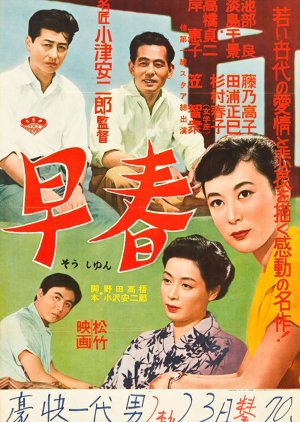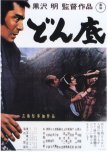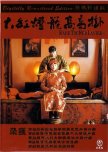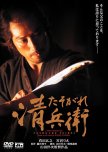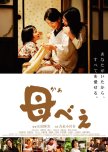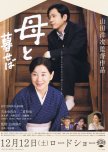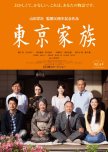
Cette critique peut contenir des spoilers
"Everyone's dissatisfied"
Ozu explored the family life of a cog in a wheel salaryman. Sugiyama Shoji personified the endless, hopeless life of the literally white collared worker who made just enough to live on but not enough to get ahead, much less dream of something different.Shoji and Masako have been married for a number of years but after the death of their baby son have drifted apart emotionally. Shoji's family is now primarily populated by the people he works with, ex-army buddies, and mahjong companions. Masako has a widow neighbor and a jaded mother she can turn to. Due to Shoji's nighttime habits of mahjong and drinking, the couple are behind in their rent. The disaffected worker is about to knock Ozu's ubiquitous train off the tracks when he begins an affair with a younger woman named Goldfish.
Aside from A Hen in the Wind's male lead, Shoji was one of the most unsympathetic leads in an Ozu film that I've seen so far. He frittered away the family money, barely spoke to his wife and treated her like a maid. He brought drunk friends home to sleep it off and walked out one evening when he surprisingly came home early and dinner wasn't ready yet. To top it all off he scarcely covered up his affair which seemed cruel. His wife did all the laundry and he didn't think she'd notice the lipstick faithlessly adorning his clothing? He didn't think she would smell another woman on him when he sauntered in after having sex with Goldfish? When she finally did confront him, he tried to gaslight her and lied like a five-year-old. With the exception of one woman who told her to stick to her guns, others, including her mother, convinced her to apologize for her part in the marital estrangement and go back to her husband. Thankfully, Shoji did finally apologize to her, however with all the emotional depth of apologizing to someone you'd accidentally bumped into. As the husband in Hen in the Wind did, he wrapped up the story with a "let's start all over again" happy ending. Ozu banged on about how disillusioned salarymen were and largely blaming Shoji's infidelity on his employment dissatisfaction. Where was the insight into the grief Masako was obviously still dealing with and her loneliness? Where was the compassion for a lonely woman with a husband who spent most of his time away from home? Why did she have to apologize for her husband sleeping with another woman?
Ozu's composition and framing were as exquisite as ever. There were the typical scenes in an Ozu film with singing and game playing, occasionally both at the same time. The 2 hours and 24 minutes film dragged badly in places. How many drinking and singing scenes were truly necessary? The waxing on about the meaninglessness of a salaryman's life became repetitious. Over and over again, Shoji was shown spending time with just about anyone but his wife which began to wear thin. It was doubly painful because Shoji never mentioned loving his wife whereas numerous characters commented on Masako's love for Shoji. At no point did Ozu show the reason Shoji decided to turn his marriage around other than for convenience's sake which made the decision emotionally hollow.
Ozu's insight into the long hours and drudgery of death by overwork was stinging. The commentary on women with unfaithful husbands was disheartening. The nicest comment about wives was Shoji's older friend played by Ozu regular, Ryu Chishu. "No one is more dependable than a wife." Sounds like something you would say about a brand of tires or dishwasher. I didn't find the unfaithful and cold Shoji a compelling or sympathetic character. He was an irresponsible husband who did nothing to earn his wife's forgiveness. Ozu made many meaningful films, for me, this wasn't one of them.
8/29/23
Cet avis était-il utile?

Rifky Nobu Mitsuki
2 personnes ont trouvé cette critique utile
Infidelity can destroy a marriage.
Yasujiro Ozu's work brought back the topic of marriage and it was quite a shock because it turned out to bring up the topic of problems that might occur in couples who usually destroy their relationship, usually called cheating.Well, what I like about Ozu's film is that it doesn't use dramatization, so it's more realistic and maybe feels relateable to some people. Like here, usually in other films it is portrayed in a vulgar and wild manner but here it feels simple but still has an impact when seen by people who have done it. (Not me, I'm single hiks ..)
Then from the wife's side, Masako, whose knowledge was built from conversations with neighbors and parents until finally she knew that the reality was well organized, when she left was understandable, and grateful she didn't ask for a divorce.
The affair between Sugi and Goldfish closes well and becomes one of the iconic scenes in this film, becoming a symbol of peace.
The drawback of this film, in my opinion, is that the emotional boost is lacking, I can cry when watching Noriko Trilogy but not here. But the moment when Masako chose to leave Sugi for a long time, was enough to inject a little emotion that was not much felt from the beginning of the film.
There was a feeling of despair in Sugi and it made me remember the words of one of the characters in this film but I forgot his name, he said "Your wife is your closest partner" and that's kinda hits me.
Sugi goes to Mitsuishi alone, then Masako follows him there was the sweetest moment in this film, indicating they have made peace with the bitter past and are willing to accept each other to start a new day together once again. Masako's reason for following Sugi to Mitsuishi was also touching, he got a letter from Mr. Onodera who said "Follow Sugi, before it becomes a bigger problem." must have made Masako think, and I'm glad she did because you never know what would happen to a man that have a burden of guilt.
------------
Another good works from Mr. Ozu.
Cet avis était-il utile?

Is Spring muddy everywhere? Are salary workers resigned everywhere?
Seeing the run time at 2hr 24 min, I was concerned this film might not hold my interest or languish in pace. Nothing to fear, the film held my interest all the way through. It's remarkable how Ozu can keep such a low pulse without putting me to sleep. In fact, I am stimulated by his films. Early Spring is no exception and was an excellent representation of Ozu's oeuvre.It seems Ozu covered riskier material in this film compared to earlier ones. The main themes covered were infidelity and the malaise of salary workers. While infidelity was addressed more often and explicitly, I believe the malaise of the salary workers was the deeper undercurrent of the film, despite its implicit narrative. There are common themes that are touched on less frequently or explicitly, such as industrial development, postwar grief, and gender roles in society (i.e. the rapid progress of strong, modern young women).
Sugi and Masako play their roles very well. The scene where Masako confronts Sugi on his transgression is quietly intense. Not even yelling or the breaking of plates could have amplified that intensity. It's difficult to tell what drives their broken relationship. Is it the death and grief of their child? Is it something problematic interpersonally with no external factors mediating the relationship issues? The filmmakers' ambiguity forces us to insert a personal interpretation to explain their circumstances.
Goldfish is less believable as a character, but so distinct and lively that I could not help but enjoy her performance. She symbolizes the salary worker's distraction from disillusionment, a chance to forget about the dull pain of repetitive boredom. One of the male coworkers, in a conversation on the suspicions of their colleagues' affair, comments that he disapproves of it, but is also envious. It might not be Goldfish, specifically, that is desired, but rather the excitement that comes with it. Many Salary workers desperately dream of something better beyond their monotony. Even the opportunity to gossip about coworkers fulfills that itch.
The support cast is a menagerie of workers, company workers, pub-restaurant owners scraping by, and so forth. It doesn't really matter what their jobs are; they're the same, just grinding, cooling themselves with hand fans, gossiping, and moving the cogs of society along.
The salary worker's life of drudgery is one I need not describe in detail. In fact, the following exchange from the film (with a few lines removed to streamline the point) says it all:
That's the fate of the salaryman
Only company directors have autos (everyone else crams on trains)
Sometimes I just hate my work
But it's difficult to change
Worse if you have children
Sure you still have your dreams
But a free life....
I'm a salaried man
Consider this selection of script from a 1956 Japanese film. If you're reading this review, chances are you are not Japanese nor are you 80 or 90 years old. Can you identify with those lines? I would guess many of us know intimately what the lifestyle of a salary worker is like. It's remarkable how cyclical and universal human life can be despite distance in culture, geography, and time/eras. Ozu isn't famous only for the fetishist filmmakers. His films are very relevant in this era for the common people. Things have changed on the surface, but the undercurrent of the salaried lifestyle is still going strong.
Cet avis était-il utile?

